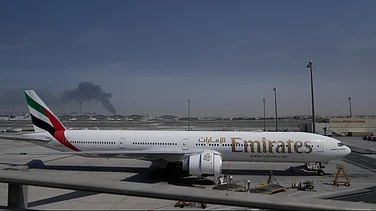The UN Security Council called Thursday for an immediate cessation of violence throughout Myanmar as the country's military coup entered a second year, and it reaffirmed support for the country's democratic transition and democratic institutions.
The UN's most powerful body also reiterated its call for the release of “all those who remain arbitrarily detained,” including Aung San Suu Kyi, whose elected government was ousted by the military on Feb. 1, 2021.
In a statement approved by all 15 members, the council expressed “deep concern” at the continuing state of emergency imposed by Myanmar's military rulers a year ago and “the dramatic increase in humanitarian need, particularly among women, children and vulnerable groups, against the backdrop of the ongoing COVID-19 pandemic.”
The first anniversary of the coup on Tuesday was marked by a nationwide strike, protests and sporadic violence across the country. Several pro-military demonstrations, widely believed to have been organized by the authorities, were also held.
Widespread nonviolent demonstrations followed the army's seizure of power and ouster of Suu Kyi, whose National League for Democracy party was about to begin a second term in office after winning a landslide election victory. After the protests were put down with lethal force by the military, armed resistance arose..
About 1,500 civilians have been killed, but the government has been unable to suppress the opposition, which has spread across the country.
Noeleen Heyzer, the new UN special envoy for Myanmar, said Monday that violence and brutality have intensified since the military took power, sparking the resistance movement, and all sides have hardened their positions on “using violence as a solution.”
She said in a virtual news conference that Myanmar's situation is increasingly unstable and military operations, including artillery attacks and airstrikes, have raised concerns about the protection of civilians.
Since the end of December, Heyzer said, the number of internally displaced people rose from more than 320,000 to over 400,000. “This is in addition to the 340,000 people already displaced before Feb. 1, 2021,” she said.
The Security Council “expressed deep concern at further recent violence in the country and expressed alarm at the large number of internally displaced persons.”
Members “condemned attacks on infrastructure, including health and education facilities.”
“They called for an immediate cessation of all forms of violence throughout the country and to ensure the safety of civilians,” the statement said.
The Security Council underlined the need to urgently step-up humanitarian aid and facilitate the unhindered delivery of COVID-19 vaccines.
Council members also reiterated their full support for the role of the 10-nation Association of Southeast Asian Nations “in facilitating a peaceful solution” and reiterated their calls for swift implementation of ASEAN's five-point consensus adopted last April that includes an immediate halt to violence, starting a dialogue among all parties.
The Security Council also addressed the plight of the Rohingya Muslim minority in Myanmar's northern Rakhine state.
In 2017, over 700,000 Rohingya fled to neighboring Bangladesh to flee a military crackdown that saw mass rapes, killings and the burning of thousands of homes. But the UN has said some 600,000 Rohingya still live in Rakhine, and the Security Council on Wednesday reiterated the need “to address the root causes of the crisis in Rakhine.”
Alluding to the coup and the current violence, council members expressed concern at the impact of recent developments for the return of Rohingya refugees and internally displaced people. They encouraged diplomatic efforts to address issues facing the Rohingya and stressed “the vital need for the rights of minorities to be fully protected.”






















